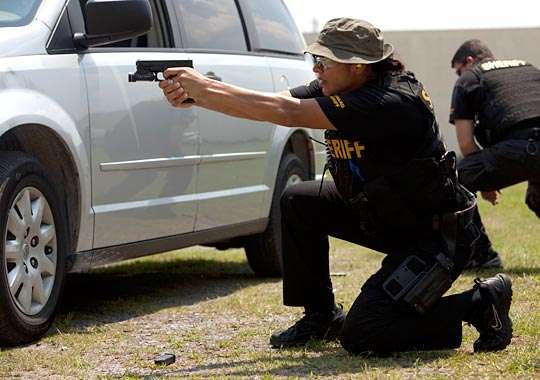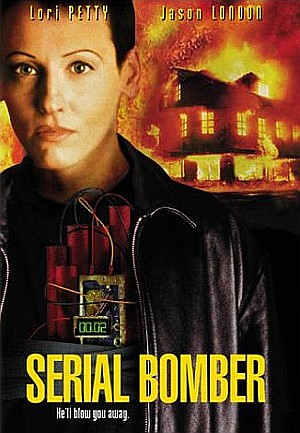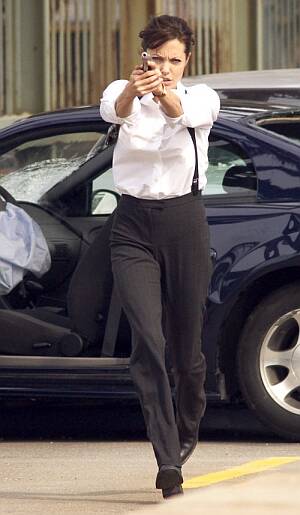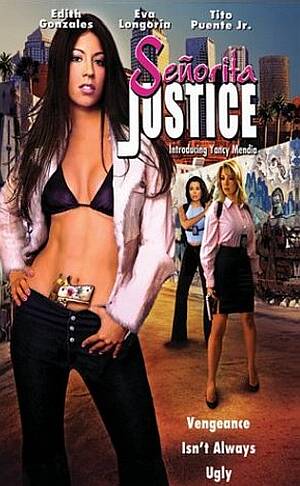 ★★★½
★★★½
“Mums with guns.”
 Twenty years ago, Cops debuted on Fox, and has become a part of the cultural landscape, leading to an avalanche of spin-offs, ranging from the serious to the complete spoofs (Reno 911 being the most notable). The very first episode took place in Broward County, Florida and, two decades later, the latest in the field returns there. PoBC, as I’m going to refer to it for obvious reasons, follows four women members of the Sheriff’s Department there, both at home and on duty, as they take down the bad guys and deal with the public.
Twenty years ago, Cops debuted on Fox, and has become a part of the cultural landscape, leading to an avalanche of spin-offs, ranging from the serious to the complete spoofs (Reno 911 being the most notable). The very first episode took place in Broward County, Florida and, two decades later, the latest in the field returns there. PoBC, as I’m going to refer to it for obvious reasons, follows four women members of the Sheriff’s Department there, both at home and on duty, as they take down the bad guys and deal with the public.
The four present a cross-section, covering three races and a broad range of ages, from 25-year old Deputy Shelunda Cooper, to Detective Julie Bower – almost double Cooper’s age, whose hair appears firmly rooted in the 1980’s. Each episode is a semi-random selection of incidents. If there’s a theme, it’s in the type of crimes with which each deals. Bower is a member of the sex-crimes unit, which covers everything from rape cases to staging prostitution stings [one of which involved her dressing up as a street hooker]. All the cases of Detective Ana Murillo seems to involve drugs, while Cooper is the queen of the “domestic” – if there’s a family squabble, she’ll be there. Detective Andrea Penoyer’s caseload has a little more variety, though she achieved a certain notoriety for her gung-ho quote, “There’s always a good time to use a Taser,” featured prominently in the trailer (below).
Murillo seems to have a little bit of an attitude, shall we say, especially if any of the members of the public with whom she comes into contact do not adopt the appropriate reverential approach – such as the woman who has the temerity to talk on her cellphone. Murillo basically confiscates the phone, and there are numerous other incidents in the show which have a questionable nature as far as constitutional rights go. Her approach to law-enforcement appears to have more in common with Judge Dredd than “To protect and serve,” though one wonders whether TLC’s description of it as a docudrama – emphasis added – has more significance than might immediately be obvious.
“I’m no different fron the guys, I still kick ass and take names – I just do it with nail-polish and lip-gloss.”
— Ana Murillo
 Despite Murillo’s unquestioned position as Empress of Lip-gloss, it’s blonde, blue-eyed Penoyer who is the glamour queen of the show – though the illusion is somewhat damaged when she starts yelling commands at suspects in a voice that’s probably the audio equivalent of getting Tazered. Though as she points out, such an attitude is necessary: “When someone walks in a room and you got a cop who is 6’5″ and 300 pounds, he looks intimidating. So we have to act intimidating: we have to be very, very serious and let people know we’re not playing around.” Well, not all the time, anyway. We also get to see Penoyer and her policewomen friends shopping for guns, and relaxing on the beach. In their bikinis.
Despite Murillo’s unquestioned position as Empress of Lip-gloss, it’s blonde, blue-eyed Penoyer who is the glamour queen of the show – though the illusion is somewhat damaged when she starts yelling commands at suspects in a voice that’s probably the audio equivalent of getting Tazered. Though as she points out, such an attitude is necessary: “When someone walks in a room and you got a cop who is 6’5″ and 300 pounds, he looks intimidating. So we have to act intimidating: we have to be very, very serious and let people know we’re not playing around.” Well, not all the time, anyway. We also get to see Penoyer and her policewomen friends shopping for guns, and relaxing on the beach. In their bikinis.
This illustrates the strange double-standard at the heart of the show: on the one hand, it wants to show that the subjects are “just like the guys”. On the other, it keeps reminding us that three of the women are mothers – two of them single moms – and takes great care to point out how much they care about their kids. That’s the dichotomy that’s at the core of girls with guns: the contrast between the maternal and life-giving aspects and the death-dealer. I suspect, however, that it would be giving the creators of the show more credit than they deserve if I were to say they were conscious of such philosophical concepts.
Oddly, it’s Cooper of whom we grew fondest, even though she seemed condemned to the pettiest of crimes – someone refusing to pay a taxi fare for instance. Yet she seemed the one most genuinely concerned with her role as a member of the community, not just as a law enforcer. In one scene, she was called to an elderly gentleman’s apartment and ended up calling his girlfriend on his behalf; in another, she gave a homeless person the sandwich her husband had bought for her dinner. When she got a ‘proper’ crime – a burglary – and was able to take fingerprints, she was so genuinely delighted, we couldn’t help but cheer – hopefully, she’ll eventually achieve her ambition of getting into the CSI side of things.
I do have some serious qualms about the philosophy of policing shown here. While there’s no denying the awful effects of drug addiction [some of those arrested are a stark, poignant reminder of that], the efforts here seem almost entirely directed at street-level pushers – who, curiously, all seem to be black. What are the odds of that? Busting them is a pointless endeavour, since it simply creates a temporary gap in the marketplace, into which someone else will stop. Even more dubious are the prostitution stings: disturbing amounts of police resources are devoted to something which is basically a massive waste of time. Want to control prostitution? Legalize it, license it and tax it.
Once again, however, the creators have little no interest in addressing such things. This is about the telegenic end of policing, where no bad guy gets away and questions about rights and the ethics of entrapment operations are not considered. It’s entertainment, pure and simple – and even as people who have a very low tolerance for “reality entertainment” [since we usually find it neither realistic nor entertaining], this is curiously habit-forming.
Shown: TLC, Thursdays, 9pm
Star: Ana Murillo, Shelunda Cooper, Julie Bower, Andrea Penoyer





 ★★★★
★★★★
 The second series of TLC’s “mommy cops” reality series struck close to home, centered as it was on Phoenix. It didn’t come as much surprise as our local sheriff, Joe Arpaio, is infamous locally as a media whore, who wastes no opportunity for self-promotion, and is a sharply-divisive figure locally, adored and loathed by about equal parts of the population. We wondered how long it would take before Joe slimed his way onto the screen: six minutes into the first episode, we had our answer. Fortunately, this was more of a blip, and our fears of an Arpaio-centered show proved largely unfounded [see the execrable Smile… You’re Under Arrest for how bad this could have been].
The second series of TLC’s “mommy cops” reality series struck close to home, centered as it was on Phoenix. It didn’t come as much surprise as our local sheriff, Joe Arpaio, is infamous locally as a media whore, who wastes no opportunity for self-promotion, and is a sharply-divisive figure locally, adored and loathed by about equal parts of the population. We wondered how long it would take before Joe slimed his way onto the screen: six minutes into the first episode, we had our answer. Fortunately, this was more of a blip, and our fears of an Arpaio-centered show proved largely unfounded [see the execrable Smile… You’re Under Arrest for how bad this could have been]. As notable as what is shown, is what was
As notable as what is shown, is what was  Finally, there’s Detective Deborah Moyer (right), who is completely marvellous, and the main reason to watch the show. A 19-year veteran, we’d be entirely happy if the show was 100% about her. While the other women occasionally seem very scripted when they are talking to the camera, that isn’t the case with Moyer: there’s a definite sense that what you see is what you get with her. While her policing style may not be “by the book” – in one episode, she basically arrests a teenage girl for failing to hug her father – her reactions are entirely natural and certainly had us nodding in approval more often than not. She just comes across as being very normal: when she encounters a young perpetrator, she tends to think about her own kids of the same age.
Finally, there’s Detective Deborah Moyer (right), who is completely marvellous, and the main reason to watch the show. A 19-year veteran, we’d be entirely happy if the show was 100% about her. While the other women occasionally seem very scripted when they are talking to the camera, that isn’t the case with Moyer: there’s a definite sense that what you see is what you get with her. While her policing style may not be “by the book” – in one episode, she basically arrests a teenage girl for failing to hug her father – her reactions are entirely natural and certainly had us nodding in approval more often than not. She just comes across as being very normal: when she encounters a young perpetrator, she tends to think about her own kids of the same age. Michael Norell (Goldwyn) sees mob boss Tommy Canard (Arkin) whacking a debtor, but won’t admit it to the cops. However, when they look at the credit-card transactions, the truth comes out and Detective Hunter (Whitfield) is sent to retrieve the witness; Canard, thanks to a mole, also finds out and send his top hitman to ensure Norell never reaches the courthouse. A heatwave has simultaneously hit New York, leading to blackouts, gridlock and a breakdown in communications, so it’s down to Detective Hunter, back on her old stomping ground, to negotiate her way through the traffic jams and dodge the killers out to get Norell.
Michael Norell (Goldwyn) sees mob boss Tommy Canard (Arkin) whacking a debtor, but won’t admit it to the cops. However, when they look at the credit-card transactions, the truth comes out and Detective Hunter (Whitfield) is sent to retrieve the witness; Canard, thanks to a mole, also finds out and send his top hitman to ensure Norell never reaches the courthouse. A heatwave has simultaneously hit New York, leading to blackouts, gridlock and a breakdown in communications, so it’s down to Detective Hunter, back on her old stomping ground, to negotiate her way through the traffic jams and dodge the killers out to get Norell. Mad bomber Chris Murdoch (London), is running around Seattle, blowing up Japanese people. FBI agent, Sara Davis (Petty) is part of the team looking into the case, but though they take Murdoch’s Japanese girlfriend (Kawagoe) into custody, Lt Sugimura (Amami) of the Tokyo police sweeps in and demands they release her, so she can be returned home – her father has influence on both sides of the Pacific. Davis won’t let that happen, since the girl is their main hope of catching the bomber; he, needless to say, is none too pleased to find the love of his life in the hands of the police.
Mad bomber Chris Murdoch (London), is running around Seattle, blowing up Japanese people. FBI agent, Sara Davis (Petty) is part of the team looking into the case, but though they take Murdoch’s Japanese girlfriend (Kawagoe) into custody, Lt Sugimura (Amami) of the Tokyo police sweeps in and demands they release her, so she can be returned home – her father has influence on both sides of the Pacific. Davis won’t let that happen, since the girl is their main hope of catching the bomber; he, needless to say, is none too pleased to find the love of his life in the hands of the police. This is a competently-made but ultimately forgettable film – it feels very much like a TVM, albeit for one of the slightly-more liberal channels. Hemingway plays Secret Service agent Lynn Delaney, who has to look after the Vice-President, when their place crashes in the Pacific. Of course, in the way things only happen in Hollywood movies, the island to which the struggle is a rebel outpost, and the VP is a former soldier, with more-than adequate combat skills of his own. Which extend to more than shooting people in the face, Dick Cheney please note. Meanwhile, there’s a lot of tension with female journalist Sharon Serrano (Bennett), who is also among the survivors; this includes tension of a sexual kind, if you know what I mean, and I think you do. Like I said: one of the slightly-more liberal channels. However, it’s nice that no big thing is made of this; you’re not whacked over the head with anyone’s sexual orientiation, as in D.E.B.S. [Curiously, even the nods in this direction are edited out from some releases]
This is a competently-made but ultimately forgettable film – it feels very much like a TVM, albeit for one of the slightly-more liberal channels. Hemingway plays Secret Service agent Lynn Delaney, who has to look after the Vice-President, when their place crashes in the Pacific. Of course, in the way things only happen in Hollywood movies, the island to which the struggle is a rebel outpost, and the VP is a former soldier, with more-than adequate combat skills of his own. Which extend to more than shooting people in the face, Dick Cheney please note. Meanwhile, there’s a lot of tension with female journalist Sharon Serrano (Bennett), who is also among the survivors; this includes tension of a sexual kind, if you know what I mean, and I think you do. Like I said: one of the slightly-more liberal channels. However, it’s nice that no big thing is made of this; you’re not whacked over the head with anyone’s sexual orientiation, as in D.E.B.S. [Curiously, even the nods in this direction are edited out from some releases] Take an FBI agent with some psychic ability, January Blackburn, and partner her with part-vampire Catholic priest, Dorian Scarletti. Intrigued? Me too. That’s the premise of the three stories in this book, where our odd couple investigate paranormal crimes around the US. The results are somewhat uneven, yet with much promise: Blackburn is probably a more interesting character, possessing both great inner strength, and quirks that make her vulnerable and more human. In contrast, Scarletti, thus far, seems a bit like a “vampire by numbers”, with all the standard moping around, relationship angst and so on, too familiar to be of more than passing interest. Though, must say, his weapon of choice – hundreds of cross-shaped throwing knives inside his coat – is worth cool points in my book (even if I presume he doesn’t go through airports).
Take an FBI agent with some psychic ability, January Blackburn, and partner her with part-vampire Catholic priest, Dorian Scarletti. Intrigued? Me too. That’s the premise of the three stories in this book, where our odd couple investigate paranormal crimes around the US. The results are somewhat uneven, yet with much promise: Blackburn is probably a more interesting character, possessing both great inner strength, and quirks that make her vulnerable and more human. In contrast, Scarletti, thus far, seems a bit like a “vampire by numbers”, with all the standard moping around, relationship angst and so on, too familiar to be of more than passing interest. Though, must say, his weapon of choice – hundreds of cross-shaped throwing knives inside his coat – is worth cool points in my book (even if I presume he doesn’t go through airports). Despite influences all over the place – Assault on Precinct 13, Aliens, Night of the Living Dead, The Magnificent Seven – Siri takes and runs with them very effectively. Laborie (Farès) is a career soldier, tasked with transporting an Albanian gangster to his trial; but the convoy is ambushed, so she and her men hole up in a nearby warehouse on a deserted industrial estate. However, it is being robbed by brothers Santino (Magimel) and Nasser (Naceri), plus their crew – and the attackers have also followed them, intent on rescuing their boss. Can they survive until help arrives?
Despite influences all over the place – Assault on Precinct 13, Aliens, Night of the Living Dead, The Magnificent Seven – Siri takes and runs with them very effectively. Laborie (Farès) is a career soldier, tasked with transporting an Albanian gangster to his trial; but the convoy is ambushed, so she and her men hole up in a nearby warehouse on a deserted industrial estate. However, it is being robbed by brothers Santino (Magimel) and Nasser (Naceri), plus their crew – and the attackers have also followed them, intent on rescuing their boss. Can they survive until help arrives? Rarely has a film started so promisingly, and gone so consistently downhill. The start is fabulous, with one of the most shocking moments I’ve seen…though if you’ve seen the trailer, you’ll have had it spoiled. But regardless, the first time we meet FBI profiler Illeana Scott (Jolie), on special assignment to Montreal, she’s lying in a grave. She is hard as nails, and takes absolutely no crap from anyone: her local friend, Captain Leclair (Karyo) hardly needs to bother protecting her, despite the nicely-handled cross-border tension. The case is that of a serial killer who, as the title suggests, inhabits the lives of his victims: the crack comes when his mother (Rowlands), believing him dead for two decades, spots him in Montreal by chance. However, the only other person to have seen the suspect is art-gallery owner James Costa (Hawke), but Scott starts finding her emotions getting in the way of her work…
Rarely has a film started so promisingly, and gone so consistently downhill. The start is fabulous, with one of the most shocking moments I’ve seen…though if you’ve seen the trailer, you’ll have had it spoiled. But regardless, the first time we meet FBI profiler Illeana Scott (Jolie), on special assignment to Montreal, she’s lying in a grave. She is hard as nails, and takes absolutely no crap from anyone: her local friend, Captain Leclair (Karyo) hardly needs to bother protecting her, despite the nicely-handled cross-border tension. The case is that of a serial killer who, as the title suggests, inhabits the lives of his victims: the crack comes when his mother (Rowlands), believing him dead for two decades, spots him in Montreal by chance. However, the only other person to have seen the suspect is art-gallery owner James Costa (Hawke), but Scott starts finding her emotions getting in the way of her work… This frothy concoction is light-hearted entertainment, which doesn’t exactly pack much of a wallop, but has some nice characters and situations. Heroine Chun (Kim), is a young cop, galled when her undercover mission is swept away by a rival; she gets another chance, but to her dismay, this involves going back to school to watch the daughter (Nam) of a gang member who has agreed to testify against his boss, but has since vanished. Of course, a hot-tempered cop with martial arts skills fits
This frothy concoction is light-hearted entertainment, which doesn’t exactly pack much of a wallop, but has some nice characters and situations. Heroine Chun (Kim), is a young cop, galled when her undercover mission is swept away by a rival; she gets another chance, but to her dismay, this involves going back to school to watch the daughter (Nam) of a gang member who has agreed to testify against his boss, but has since vanished. Of course, a hot-tempered cop with martial arts skills fits  This is an interesting contrast to Sunland Heat which took a woeful script and executed it briskly enough to work. Here, the story isn’t bad – Anna Rios, a Hispanic lawyer (with a special forces background!) goes back to her roots, after her brother is gunned-down, and uncovers a maze of murky deals. It’s the execution which is largely inept, “Kantz” providing further evidence that one-name directors suck at GWG films – see also Charlie’s Angels: Full Throttle (McQ), Catwoman (Pitof), Ecks vs. Sever (Kaos) and Tomb Raider 2 (Jandebont).
This is an interesting contrast to Sunland Heat which took a woeful script and executed it briskly enough to work. Here, the story isn’t bad – Anna Rios, a Hispanic lawyer (with a special forces background!) goes back to her roots, after her brother is gunned-down, and uncovers a maze of murky deals. It’s the execution which is largely inept, “Kantz” providing further evidence that one-name directors suck at GWG films – see also Charlie’s Angels: Full Throttle (McQ), Catwoman (Pitof), Ecks vs. Sever (Kaos) and Tomb Raider 2 (Jandebont).